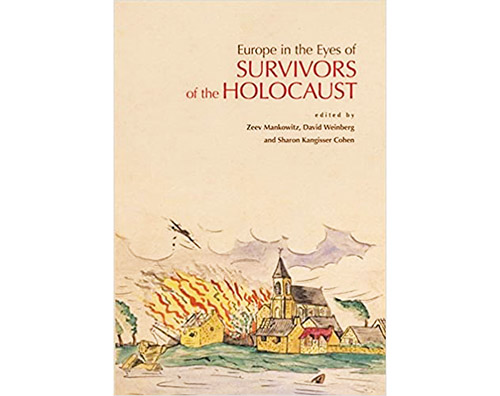
Reviewing: “Europe in the Eyes of Survivors of the Holocaust.” Zeev Mankowitz, David Weinberg, Sharon Kangisser Cohen, Editors. Yad Vashem Publications. 2014. 256 pages. English. ISBN-13: 978-9653084650.
The editors of this volume deserve an enormous amount of gratitude for their intense work on this unique and critical analysis of the attitudes and behavior of survivors in the aftermath of the Shoah. All too often we were told survivors rapidly left their past behind them “to block out” their horrific experiences. A more complex picture emerges according to these scholars. To be sure, the “vast majority” of survivors probably identified with one woman who asserted that Europe had become “a grave that has consumed my dear loved ones, my hopes and yearnings and my beautiful years.” For them, Europe had betrayed and abandoned them. They could no longer live with their perpetrators and bystanders. Many found themselves homeless; their residences had been confiscated by former friends and neighbors.
Perhaps they agreed with historian Henry Feingold who observed: “The Jews were not a ‘dissident minority’ in ‘a remote corner of the world,’ but by virtue of its thinkers were an important component of European civilization which dominated the pre-Holocaust world. What died at Auschwitz was not merely the corpus of a people but Europe’s hope that its social system can endure. Who can escape the bitter irony that European Jewry was destroyed by a perverse use of the very industrial process which is the hallmark of modernity?”
Other survivors, who were much more a part of European culture, traditions and language, could not avoid their past, which continued to influence their perspectives. Those who remained in Europe viewed their presence on the Continent as “a testament to the victims or as a reflection of their ongoing commitment to what they regarded as the underlying ideals of their native countries.” Still many other individuals were in the middle of these two approaches, by making the distinction between life before the war and their wartime experiences. Wherever they decided to reside, their link to Europe endured.
Victor E. Frankl, an Austrian neurologist, psychiatrist, philosopher, founder of logotherapy and author of “Man’s Search for Meaning,” was certain the gas chambers of Auschwitz, Treblinka and Majdanek “were ultimately prepared not in some ministry in Berlin, but rather at the desks and lectures halls of nihilistic scientists and philosophers.” In “The Unconscious God,” he argued that everyone has a religious awareness in their unconscious mind. Though he lived in Vienna, he spent time in the United States, where his belief that life has meaning even after experiencing the Shoah, and that God does exist, made him a pioneer in the self-help arena.
This profound connection to Europe is evident from the essays in this group of Jewish scholars and public figures including Jean Améry, Aharon Apelfeld, Leo Baeck, Paul Celan, Marek Edelman, Viktor E. Frankl, Abba Kovner, Emmanuel Lévinas, Elie Wiesel and Joseph Winkler. The editors hoped their work would be a substantial contribution to post-Holocaust studies that would encourage other scholars to focus on this significant field of contemporary Jewish history and thought.
One area that should be pursued is why some Orthodox Jews survivors chose to remain in Europe, given the opportunities to live a more authentic Jewish life in their ancestral homeland.
Abba Kovner, “an unsung and largely unknown hero of the Second World War and Israel’s War of Independence,” was born in Crimea, and was a partisan leader in the Vilna Ghetto. On December 31, 1941, Kovner united a divided resistance movement in the ghetto with these words: “Jewish youth! Do not trust those who are trying to deceive you. Hitler plans to destroy all the Jews of Europe. … We will not be led like sheep to the slaughter! True, we are weak and defenseless, but the only reply to the murderer is revolt! Brothers! Better to fall as free fighters than to live by the mercy of the murderers. Arise! Arise with your last breath!”
He guided members of the underground through sewage canals to the forest, where he commanded a partisan unit with a few hundred Jewish men and women, as part of the Soviet-Lithuanian partisan movement. Abraham Gontownik, the father of Jerry Gontownik of Englewood, New Jersey, fought with Kovner’s partisan unit.
After the war, Kovner immigrated to Israel where he played a major role in the development of the Diaspora Museum. He became a distinguished Israeli poet, writer and “a charismatic educator.” He believed in the “Unity of Israel,” that after the Shoah there was no place for their war controversies.
In a speech to the German Parliament on Holocaust Remembrance Day, January 27, 2000, Elie Wiesel declared: “Memory is the keyword. To remember is to forge links between past and present, between past and future.” Addressing Germany’s youth, he said: “Remember is the commandment that dominates the lives of Jews today: Let it dominate your lives as well. Challenged by memory, we can move forward together. Opposed to memory, you will remain eternally opposed to us and to all we stand for. Remember the Jewishness of the Jewish victims, remember the uniqueness of their tragedy. True, not all victims were Jews, but all Jews were victims.”
Alex Grobman is senior resident scholar at the John C. Danforth Society and a member of the Council of Scholars for Peace in the Middle East.













